How Small Businesses Can Manage Reviews to Strengthen Their Online Reputation

How Small Businesses Can Manage Reviews to Strengthen Their Online Reputation
A small business’s online reputation is linked to online reviews customers leave on social media and third-party review sites. Most small businesses recognize the importance of responding to online reviews but don’t actively promote their brand to build their online reputation. A proactive approach to reviews management allows businesses more control over their brand’s online narrative and the opportunity to build their digital reputation.
Online reviews facilitate trust between consumers and companies in the digital marketplace.
While positive reviews are invaluable for a small business wanting to boost their brand and attract new customers, negative reviews can threaten the business’s online reputation and offline success.
The Manifest surveyed 529 small businesses from across the U.S. to understand how they manage online reviews and their reputation, if at all.
We use the Small Business Administration’s definition of small businesses as those that have limited revenue and between 1 and 500 employees.
Small businesses can use this report to learn how other small businesses approach online review management through a combination of proactive and reactive methods that draw from their public relations, search engine optimization (SEO), and marketing strategies.
Our Findings
- More than half of small businesses (53%) publicly respond to negative reviews about their business online, demonstrating to customers their openness to feedback and dedication to customer service.
- Nearly half of small businesses (48%) privately reach out to those who left negative reviews to resolve more complex issues. Businesses that respond privately should also respond publicly to provide a record to future customers that they responded to the feedback.
- More than half of small businesses (60%) don’t encourage customers to leave positive reviews, which puts them at a disadvantage and may impact their search engine rankings.
- The majority of small businesses that monitor their online reputation (94%) have a social media presence.
- More than half of small businesses (51%) publicly respond to negative reviews and comments on social media, but less than half of small businesses (44%) actively promote positive content about their brand on social media.
Publicly Respond to Negative Reviews
Most small businesses recognize the impact online reviews can have on their brand’s image and respond to online reviews as part of their PR strategy.
More than half of small businesses (53%) publicly respond to negative reviews about their business online, and nearly half of small businesses (48%) privately reach out to those who left negative reviews to make amends.
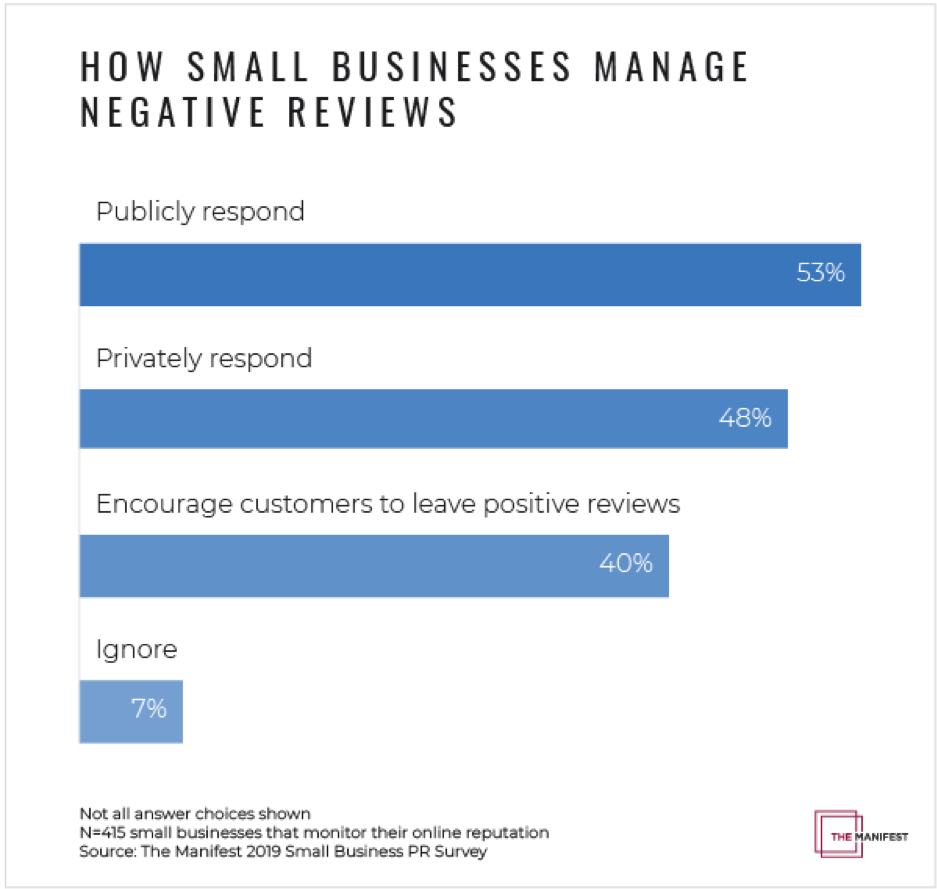
Sometimes, businesses will need to reach out privately to the reviewer if the issue cannot be quickly resolved. However, businesses should always also respond publicly so that other consumers can see that they acknowledged and handled the complaint.
Although negative reviews can deter future customers, if and how a business responds to the unhappy reviews can potentially offset any consequences from the complaint.
"If a potential customer sees a company’s response to a negative review, they’re more likely to buy from them because it shows they care about their customers' feedback," said Anthony Will, CEO of Reputation Resolutions, an online reputation management firm that helps clients repair, enhance, and protect their online reputation.
If a potential customer sees a company’s response to a negative review, they’re more likely to buy from them because it shows they care about their customers' feedback.
By publicly responding to negative reviews, small businesses can reclaim some control over the situation while demonstrating their commitment to customer service.
When The Tour Guy, a startup that specializes in authentic walking tour experiences in Europe, receives feedback through an online review, it responds in a professional manner by acknowledging the grievance and explaining how it will resolve the issue.
For example, in 2018, Kelsey F. left a review about her overall positive experience with The Tour Guy. Her only complaint was about a booking glitch that did not honor a 10% discount.
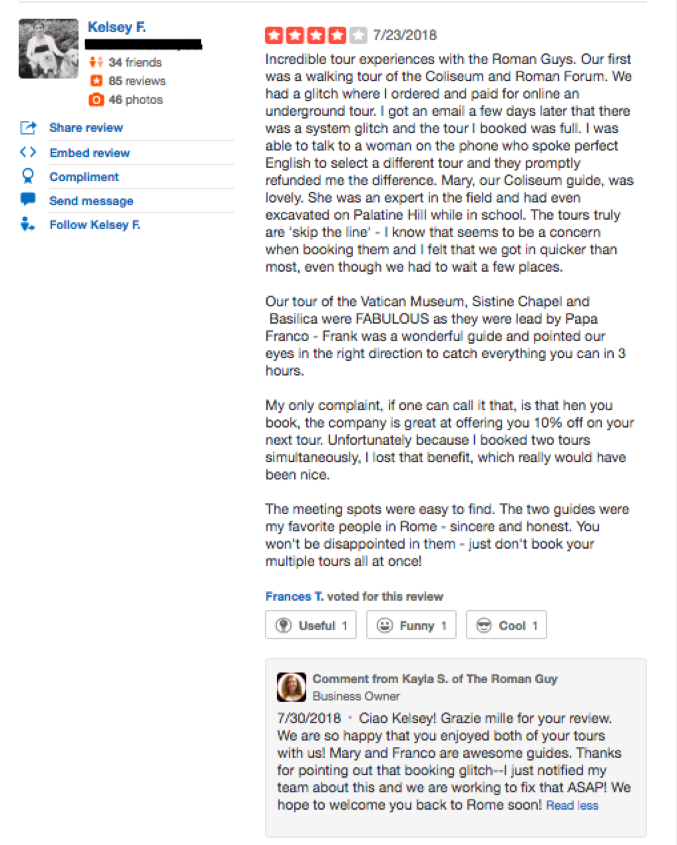
Kayla S. from The Tour Guy responded promptly and professionally, thanking Kelsey F. for her feedback and outlining the steps the company would take to resolve the booking glitch.
From this review, customers see that The Tour Guy is open to feedback, cares about its customers, and will actively address any concerns.
Small businesses that respond publicly to negative reviews show others they care about their customers’ experiences and seek to resolve issues.
Even if a small business needs to reach out to the reviewer privately to handle a more involved issue, it should also respond publicly to show other customers they acknowledged the complaint and handled it appropriately.
Don’t Forget About Positive Reviews
The human brain is wired to focus on negatives. However, small businesses should also take time to acknowledge positive reviews.
Businesses might think there’s no need to respond to positive reviews because the customer already left feedback, but this is not the case said Jason Patel, founder of Transizion, a college and career prep company that is focused on closing the opportunity divide in America.
“Always respond to positive reviews with gratitude,” Patel said.
According to Patel, businesses can benefit from responding to positive reviews in two ways:
- It may initiate a positive feedback loop. Customers will be happy with your response and may feel encouraged to ask their friends who are also customers to leave positive reviews.
- Prospective customers will appreciate your personable approach and tone and be more likely to see you as a trustworthy brand.
By responding to positive reviews, you can build rapport with your happy customers. The response doesn’t have to be long; it can be as simple as thanking the reviewer and wishing them luck in the future.
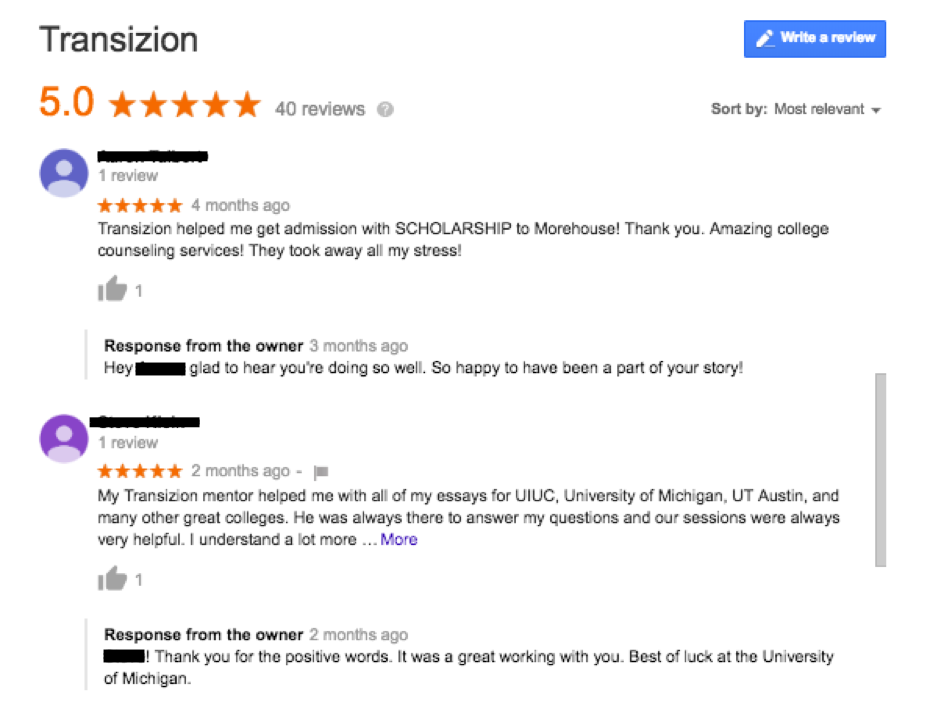 Both positive and negative reviews present opportunities for businesses to promote their brands.
Both positive and negative reviews present opportunities for businesses to promote their brands.
With negative reviews, businesses have the opportunity to demonstrate their commitment to customer service. With positive reviews, businesses can acknowledge and highlight their successes to potential customers.
Monitor for Fake Reviews and Navigate With Caution
Small businesses should have a strategy in place for managing fake reviews, which can severely impact their online reputation.
Fake reviews can be written by bots, competitors, people posing as customers, or people who mix up similarly named businesses.
Kent Lewis, president and founder of Anvil Media, a digital marketing agency, suggested steps for managing fake reviews. In these situations, small businesses should:
- Flag the fake review to alert the platform.
- Contact the platform to have the fake reviews removed.
- Reach out to the reviewer directly to have it removed.
- Draft a public response to address the fake review while maintaining a professional tone.
Dr. Anne E. Beall, head of Beall Research, experienced what she calls an “online fake review nightmare” in 2017.
Bruce Alan Beal, the head of Beal Research, posted a tweet saying he didn’t care about the well-being of Texans following the floods of Hurricane Harvey.
With only a one-letter difference in their names, many people began to post negative reviews about Beall Research, mistaking it for Beal Research.
Dr. Beall said that her company received many negative reviews that were meant for Beal Research. The result was a public relations crisis that severely threatened Beall Research’s reputation, both online and offline.
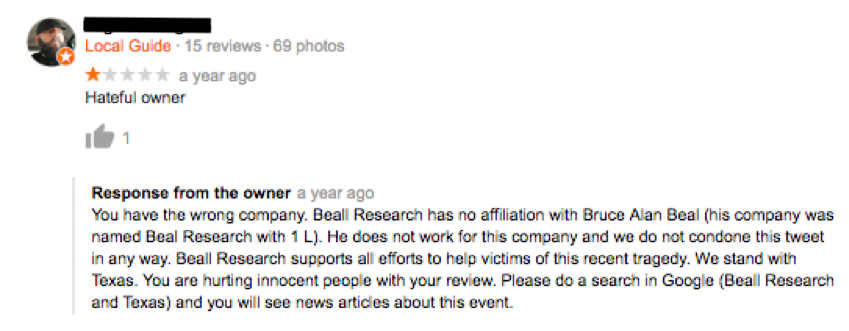
She responded to each of these reviews, professionally explaining that her company is not affiliated with the Beal Research associated with the tweet. She also contacted Google, explained that these reviews were not meant for her business, and addressed the mix up on her website and through a press release.
“We had many of the fake reviews removed but not all of them,” Dr. Beall said.
Some of these fake reviews remain listed on the business’s Google My Business page but have been pushed down with positive reviews from Dr. Beall’s clients.
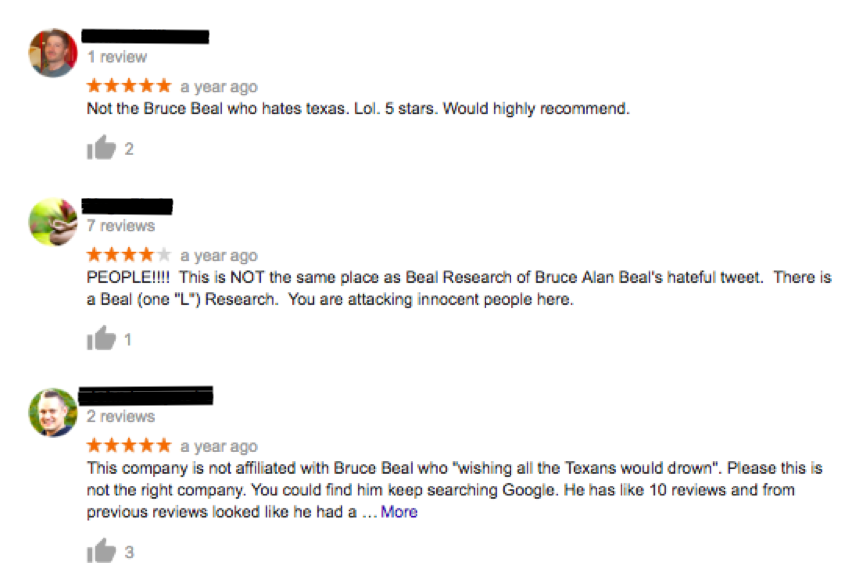
Facing this branding crisis, Dr. Beall took all the necessary steps to dissociate Beall Research from Beal Research.
By actively monitoring their online reputation, small businesses can stay aware of conversations happening around their brand and address fake reviews in a timely manner before they can do long-lasting damage to their online reputation.
Encourage Customers to Leave Positive Reviews
Small businesses that want to grow their online reputation must actively build their brand’s authority online.
However, more than half of small businesses (60%) don’t encourage customers to leave positive reviews.

The 40% of small businesses that encourage their customers to leave positive reviews put themselves at a competitive advantage by actively building their online reputation instead of just reacting to what others say about their brand.
Alan Rabinowitz, CEO of SEO Image, an internet marketing agency specializing in SEO and online reputation management services, said customers are more likely to complain about bad service than compliment a job well done.
In fact, people are 52% more likely to write a negative review about a bad experience than a positive review about a good experience.
It takes approximately 40 positive reviews to undo the damage of a single negative review, and businesses that encourage positive reviews can potentially create a buffer against future negative reviews.
Asking customers for positive reviews may feel uncomfortable, but it doesn’t have to be.
“It’s not hard to get a happy client to write a review, but it does take a little bit of nudging,” Rabinowitz said.
It’s not hard to get a happy client to write a review, but it does take a little bit of nudging.
For example, Samir Idnani, co-owner of NaanStop, a fast-casual Indian restaurant in Atlanta, encourages customers who post positive reviews on social media to do so on Google Reviews or Yelp as well.
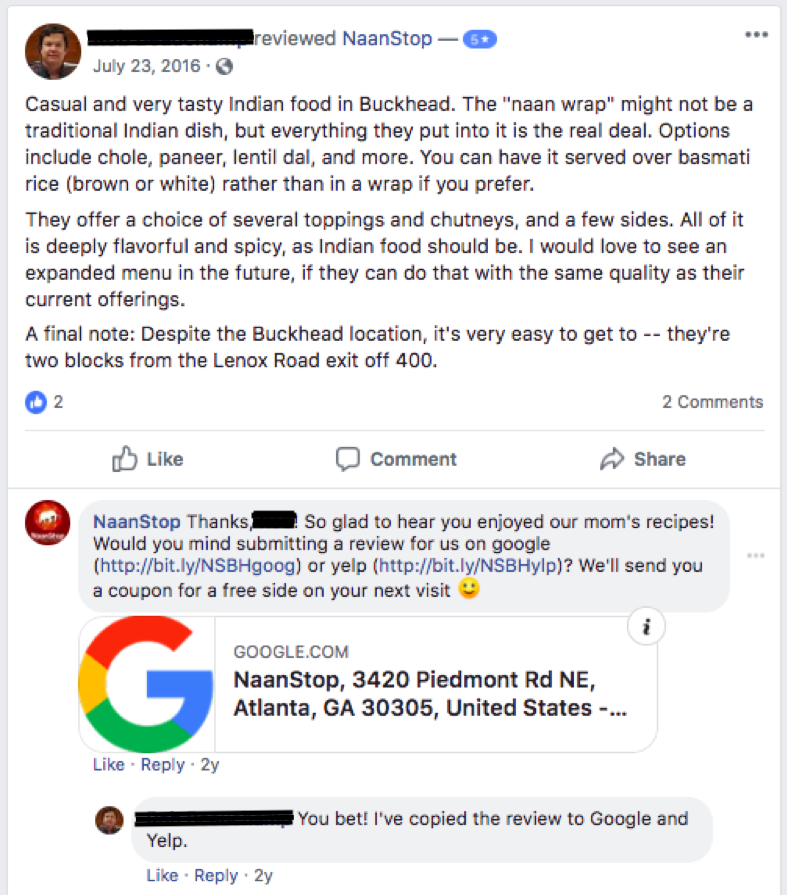
In this case, Idnani offered the reviewer a small incentive (a free side) to re-post the positive review to the restaurant’s Google My Business page or Yelp, which the reviewer did gladly.
Encouraging customers to leave reviews about their experience is a great way to hold your small business accountable, collect feedback, and build your online image.
Understand How Online Reviews Can Impact Your Search Engine Rankings
Negative online reviews on sites such as Yelp, Amazon, and Google not only can deter potential customers but also can impact a business’s visibility in search engines.
Negative reviews influence if a business occupies a seat in the competitive and coveted three-pack for map listings on Google, said Rabinowitz.
For example, those visiting Manhattan and looking for a cafe might type into Google “cafes in new york manhattan” or “cafe near me.”

A map listing of the top three cafes in the area will appear at the top of the search engine result page, most likely in the first position.
According to Moz, a three-pack (also called a snack pack) will get 44% of all clicks when it is positioned above organic listings and includes local businesses with reviews; only 8% of users click to see “More Places.”
Businesses with 4-star ratings or higher are most likely to occupy positions in the three-pack, Rabinowitz said.
Small businesses that do not monitor or manage online reviews risk decreasing their visibility in search engine results, rendering their brand invisible to potential customers.
Promote Your Brand Through Social Media
Social media is a powerful marketing tool that can help businesses exercise greater control over their brand’s online narrative, but not enough small businesses use social media proactively to promote their brand.
Although nearly all small businesses that monitor their online reputation (94%) have a social media presence, most do not maximize the potential social media holds for businesses looking to build their online reputation.

More than half of small businesses (51%) publicly respond to negative reviews and comments on social media, but fewer small businesses (44%) promote positive content about their brand on their social media platforms.

This shows that businesses are more likely to approach online reputation management reactively rather than proactively.
Promoting positive content about your brand on social media can help you build rapport with consumers, increase conversions, and control your brand’s reputation.
Positive content could include:
- Third-party reviews or testimonials
- Photos of your company’s corporate social responsibility initiatives
- Case studies
- An explainer video
- A how-to guide
- Information on upcoming events
Some businesses use tools such as Small Thanks With Google to create marketing materials and social media posts that feature positive reviews.
For example, TheeDigital, a web design and internet marketing agency, hosts a monthly WordPress and SEO training. Many people who attended the training wrote reviews that praised the workshop and trainer.
Lauren Elliott, marketing communications manager at TheeDigital, used Small Thanks to create images that highlight these positive reviews.

Posting content that highlights positive reviews can help potential customers decide if your business is a good fit while letting you claim greater control over your brand’s digital reputation. However, businesses should avoid coming across as overly promotional.
“There is a fine line between promoting positive content that's useful and promoting positive content that's just boastful,” Elliott said. “You want to help your target audience make the best decision for them - not just say how great you are.”
There is a fine line between promoting positive content that's useful and promoting positive content that's just boastful. You want to help your target audience make the best decision for them - not just say how great you are.
Social media presents marketing opportunities to build your online reputation.
Promoting positive content about your brand on social media can help customers better understand your brand, products, and services while learning about your achievements.
Integrate Online Review Management in Your PR, SEO, and Marketing Strategies
Online reviews can damage a small business’s reputation. If properly managed, however, reviews can also boost a small business’s visibility in Google’s search results and motivate people to choose a particular company over its competitors.
Small businesses that respond to happy and unhappy customers as part of their PR strategy will preserve their brand’s image.
Those that apply SEO best practices and understand how negative reviews can impact their local rankings will remain relevant online.
Businesses that share positive content about their brand on social media and encourage customers to leave positive reviews position themselves as advocates of their own brand rather than passive bystanders.
By merging online reputation management efforts with PR, SEO, and marketing strategies, small businesses can approach online reviews more holistically, boost their brand’s overall image, and claim greater control of their brand’s online narrative.
About the Survey
The Manifest surveyed 529 small businesses from across the U.S., 415 of which indicated they monitor their online reputation at least quarterly.
Most survey respondents were male (52%), and 48% were female.
Twenty-nine percent (29%) of respondents were millennials (ages 18-34); 45% were Generation Xers (ages 35-54), and 27% were baby boomers (ages 55 and up).
Fourteen percent of small businesses surveyed (14%) have 1 employee; 64% have 2-50 employees; 25% have 51-250 employees, and 7% have 251-500 employees.
